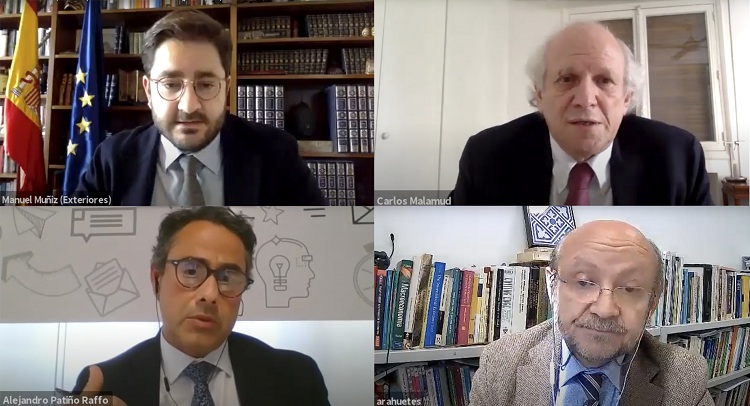The Diplomat
Experts gathered for a webinar on the risks, challenges and opportunities for Spanish companies in Latin America in the wake of the pandemic, agreed that any company aiming for growth must continue to keep the region in its sights.
The event, organised by the Exporters and Investors Club and Iberglobal, was attended by the Secretary of State for Global Spain, Manuel Muñiz, who recalled that Spanish companies have been key to the development of Latin America, because Spanish investment and exports have contributed to the improvement of infrastructure and quality of life in the destination countries, as well as to the progress of digitalisation in countries that had been left behind in the field of technology.
Muñiz also highlighted some factors of concern for the region, such as the economic slowdown it has been suffering for years and which has been accentuated by the Covid-19 crisis, or the limited fiscal and monetary margin that these countries have, which significantly increases the risk of suffering a debt crisis. To this end, he argued that “it is necessary to implement bilateral or global initiatives, through multilateral institutions, that help to alleviate the situation and allow Spanish companies to develop with greater security”.
Alejandro Patiño Raffo, from Santander Spain, indicated that, despite a reduction in the rate of investment in the region, in the last five years the number of SMEs that have set up in Latin America has grown significantly. “It is a phenomenon that we have been seeing since 2012, but which has clearly registered a turning point since 2015, especially in destination countries such as Colombia, Peru and Chile,” he said.
In this regard, Patiño recalled Banco Santander’s commitment to Latin America as a region with “a large number of opportunities for Spanish companies in areas such as infrastructure, renewable energy and new technologies”.
The data corroborate the interest that Latin America continues to arouse for Spanish companies, which is confirmed by the fact that it continues to be the second region in the world that receives the most Spanish investment. “This was the case in 2020, placing it behind the EU countries and ahead of the United States”, highlighted Alfredo Arahuetes, Professor of Applied Economics at ICADE and expert in Latin American economics.
Manuel Muñiz also stressed that the stock of Spanish investment in Latin American countries is, according to the latest data, 140,000 million euros, “which, he said, represents a third of worldwide investment”. He also assured that in the last fifteen years “the figure for commercial exchanges has doubled and the number of exporting companies has multiplied fourfold”.
Arahuetes also explained that Spanish investment in the region is concentrated in a group of six countries which include, in this order, Brazil, Mexico, Argentina, Chile, Peru and Colombia. “This group accounts for 90% of net and gross flows, and of the stock of direct investment,” he explained. The remaining ten percent of investment goes to Uruguay, Panama, the Dominican Republic, Ecuador, Costa Rica and Cuba. “Venezuela, due to organisational problems in the country, is not on the list at the moment,” he said.
He also indicated that it will be in this group of countries where there will be opportunities to continue investing in the future. “In the 1990s, it was the big companies that set up in the region, attracting smaller ones. However, we are now seeing how Spanish companies have begun to relate to local companies”, explained Arahuetes.
For this expert, Latin America continues to have great potential for Spanish investment, both because of the experience accumulated over the last thirty years and for reasons of cultural proximity. “Companies end up investing where they understand things, and in the case of Spanish companies, they feel comfortable in a region where companies from other countries have not been, due to the cultural factor,” he said.
Carlos Malamud, Professor of American History at the UNED and Senior Researcher at the Elcano Royal Institute, pointed out that, beyond the economic impact, the Covid-19 pandemic has had a “terrible social impact because it has come at a time of strong disaffection with politics, with the elites and with democracy”, which has resulted in the rise of “extremist populism” on the right and the left.
Malamud recalled that in the period 2021-2024 there will be presidential elections in all Latin American countries, which will contribute to widening the fragmentation of the region. “The reaction we have seen from Latin America in relation to the fight against the pandemic has been a predominance of individual country responses rather than collective responses from groups of countries or economic integration zones. This is a new challenge for Spanish companies, but it is also a new challenge for local companies,” he explained.
Malamud acknowledged that “the road to regional integration is quite complicated and is still a long way off”. In fact,” he said, “the regional economic integration processes that were born at the beginning of the 21st century are in crisis or have disappeared, which means that the creation of a large Latin American market is, at present, an impossible wish to achieve”.
In this sense, he stressed the importance of “not having a global policy for the region”. In his opinion, it is better to focus on “bilateral relations with each country”, which would allow us to adjust to the characteristics of each one of them, he said.






